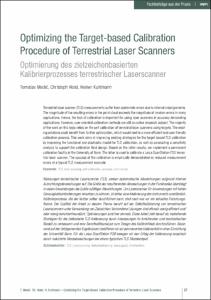Medić, Tomislav; Holst, Christoph; Kuhlmann, Heiner: Optimizing the Target-based Calibration Procedure of Terrestrial Laser Scanners : Optimierung des zielzeichenbasierten Kalibrierprozesses terrestrischer Laserscanner. In: Allgemeine Vermessungs-Nachrichten : AVN ; Zeitschrift für alle Bereiche der Geodäsie und Geoinformation. 127.2020, 1, 27-36.
Online-Ausgabe in bonndoc: https://hdl.handle.net/20.500.11811/8770
Online-Ausgabe in bonndoc: https://hdl.handle.net/20.500.11811/8770
@article{handle:20.500.11811/8770,
author = {{Tomislav Medić} and {Christoph Holst} and {Heiner Kuhlmann}},
title = {Optimizing the Target-based Calibration Procedure of Terrestrial Laser Scanners : Optimierung des zielzeichenbasierten Kalibrierprozesses terrestrischer Laserscanner},
publisher = {Wichmann, VDE Verlag},
year = 2020,
journal = {Allgemeine Vermessungs-Nachrichten : AVN ; Zeitschrift für alle Bereiche der Geodäsie und Geoinformation},
volume = 127.2020,
number = 1,
pages = 27--36,
note = {Terrestrial laser scanner (TLS) measurements suffer from systematic errors due to internal misalignments. The magnitude of the resulting errors in the point cloud exceeds the magnitude of random errors in many applications. Hence, the task of calibration is important for using laser scanners at accuracy demanding applications. However, user-oriented calibration methods are still an active research subject. The majority of the work on this topic relies on the self-calibration of terrestrial laser scanners using targets. The existing solutions could benefit from further optimization, which would lead to a more efficient and user-friendly calibration process. This work aims at improving existing strategies for the target-based TLS calibration by improving the functional and stochastic model for TLS calibration, as well as conducting a sensitivity analysis to support the calibration field design. Based on the latter results, we implement a permanent calibration facility at the University of Bonn. The latter is used to calibrate a Leica ScanStation P20 terrestrial laser scanner. The success of the calibration is empirically demonstrated by reduced measurement errors at a typical TLS measurement example.},
url = {https://hdl.handle.net/20.500.11811/8770}
}
author = {{Tomislav Medić} and {Christoph Holst} and {Heiner Kuhlmann}},
title = {Optimizing the Target-based Calibration Procedure of Terrestrial Laser Scanners : Optimierung des zielzeichenbasierten Kalibrierprozesses terrestrischer Laserscanner},
publisher = {Wichmann, VDE Verlag},
year = 2020,
journal = {Allgemeine Vermessungs-Nachrichten : AVN ; Zeitschrift für alle Bereiche der Geodäsie und Geoinformation},
volume = 127.2020,
number = 1,
pages = 27--36,
note = {Terrestrial laser scanner (TLS) measurements suffer from systematic errors due to internal misalignments. The magnitude of the resulting errors in the point cloud exceeds the magnitude of random errors in many applications. Hence, the task of calibration is important for using laser scanners at accuracy demanding applications. However, user-oriented calibration methods are still an active research subject. The majority of the work on this topic relies on the self-calibration of terrestrial laser scanners using targets. The existing solutions could benefit from further optimization, which would lead to a more efficient and user-friendly calibration process. This work aims at improving existing strategies for the target-based TLS calibration by improving the functional and stochastic model for TLS calibration, as well as conducting a sensitivity analysis to support the calibration field design. Based on the latter results, we implement a permanent calibration facility at the University of Bonn. The latter is used to calibrate a Leica ScanStation P20 terrestrial laser scanner. The success of the calibration is empirically demonstrated by reduced measurement errors at a typical TLS measurement example.},
url = {https://hdl.handle.net/20.500.11811/8770}
}






